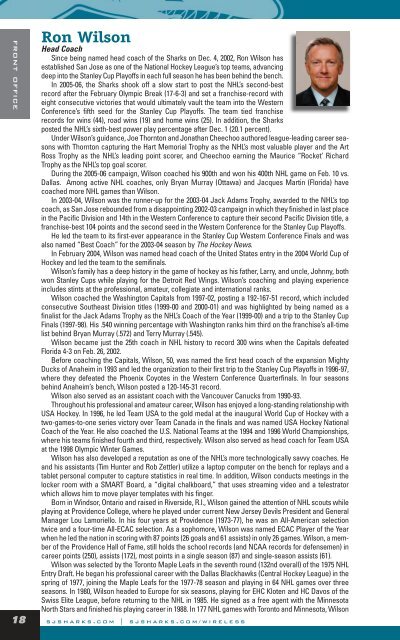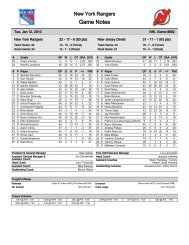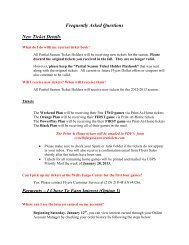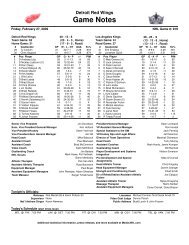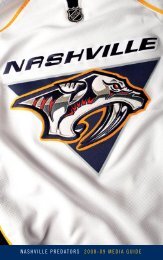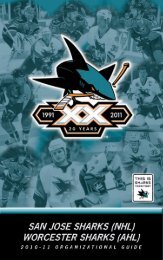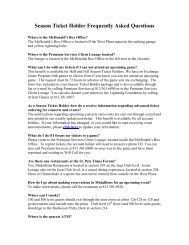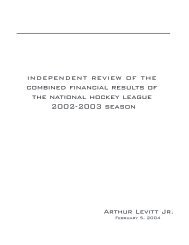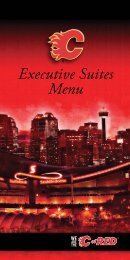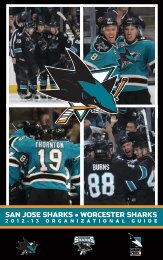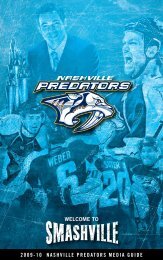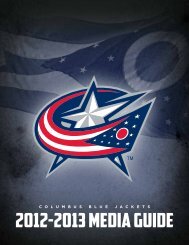You also want an ePaper? Increase the reach of your titles
YUMPU automatically turns print PDFs into web optimized ePapers that Google loves.
001-028 <strong>hpc</strong> 9/25/06 3:22 PM Page 18front officeRon WilsonHead CoachSince being named head coach of the Sharks on Dec. 4, 2002, Ron Wilson hasestablished San Jose as one of the National Hockey League’s top teams, advancingdeep into the Stanley Cup Playoffs in each full season he has been behind the bench.In 2005-06, the Sharks shook off a slow start to post the <strong>NHL</strong>’s second-bestrecord after the February Olympic Break (17-6-3) and set a franchise-record witheight consecutive victories that would ultimately vault the team into the WesternConference’s fifth seed for the Stanley Cup Playoffs. The team tied franchiserecords for wins (44), road wins (19) and home wins (25). In addition, the Sharksposted the <strong>NHL</strong>’s sixth-best power play percentage after Dec. 1 (20.1 percent).Under Wilson’s guidance, Joe Thornton and Jonathan Cheechoo authored league-leading career seasonswith Thornton capturing the Hart Memorial Trophy as the <strong>NHL</strong>’s most valuable player and the ArtRoss Trophy as the <strong>NHL</strong>’s leading point scorer, and Cheechoo earning the Maurice “Rocket’ RichardTrophy as the <strong>NHL</strong>’s top goal scorer.During the 2005-06 campaign, Wilson coached his 900th and won his 400th <strong>NHL</strong> game on Feb. 10 vs.Dallas. Among active <strong>NHL</strong> coaches, only Bryan Murray (Ottawa) and Jacques Martin (Florida) havecoached more <strong>NHL</strong> games than Wilson.In 2003-04, Wilson was the runner-up for the 2003-04 Jack Adams Trophy, awarded to the <strong>NHL</strong>’s topcoach, as San Jose rebounded from a disappointing 2002-03 campaign in which they finished in last placein the Pacific Division and 14th in the Western Conference to capture their second Pacific Division title, afranchise-best 104 points and the second seed in the Western Conference for the Stanley Cup Playoffs.He led the team to its first-ever appearance in the Stanley Cup Western Conference Finals and wasalso named “Best Coach” for the 2003-04 season by The Hockey News.In February 2004, Wilson was named head coach of the United States entry in the 2004 World Cup ofHockey and led the team to the semifinals.Wilson’s family has a deep history in the game of hockey as his father, Larry, and uncle, Johnny, bothwon Stanley Cups while playing for the Detroit Red Wings. Wilson’s coaching and playing experienceincludes stints at the professional, amateur, collegiate and international ranks.Wilson coached the Washington Capitals from 1997-02, posting a 192-167-51 record, which includedconsecutive Southeast Division titles (1999-00 and 2000-01) and was highlighted by being named as afinalist for the Jack Adams Trophy as the <strong>NHL</strong>’s Coach of the Year (1999-00) and a trip to the Stanley CupFinals (1997-98). His .540 winning percentage with Washington ranks him third on the franchise’s all-timelist behind Bryan Murray (.572) and Terry Murray (.545).Wilson became just the 25th coach in <strong>NHL</strong> history to record 300 wins when the Capitals defeatedFlorida 4-3 on Feb. 26, 2002.Before coaching the Capitals, Wilson, 50, was named the first head coach of the expansion MightyDucks of Anaheim in 1993 and led the organization to their first trip to the Stanley Cup Playoffs in 1996-97,where they defeated the Phoenix Coyotes in the Western Conference Quarterfinals. In four seasonsbehind Anaheim’s bench, Wilson posted a 120-145-31 record.Wilson also served as an assistant coach with the Vancouver Canucks from 1990-93.Throughout his professional and amateur career, Wilson has enjoyed a long-standing relationship withUSA Hockey. In 1996, he led Team USA to the gold medal at the inaugural World Cup of Hockey with atwo-games-to-one series victory over Team Canada in the finals and was named USA Hockey NationalCoach of the Year. He also coached the U.S. National Teams at the 1994 and 1996 World Championships,where his teams finished fourth and third, respectively. Wilson also served as head coach for Team USAat the 1998 Olympic Winter Games.Wilson has also developed a reputation as one of the <strong>NHL</strong>’s more technologically savvy coaches. Heand his assistants (Tim Hunter and Rob Zettler) utilize a laptop <strong>com</strong>puter on the bench for replays and atablet personal <strong>com</strong>puter to capture statistics in real time. In addition, Wilson conducts meetings in thelocker room with a SMART Board, a “digital chalkboard,” that uses streaming video and a telestratorwhich allows him to move player templates with his finger.Born in Windsor, Ontario and raised in Riverside, R.I., Wilson gained the attention of <strong>NHL</strong> scouts whileplaying at Providence College, where he played under current New Jersey Devils President and GeneralManager Lou Lamoriello. In his four years at Providence (1973-77), he was an All-American selectiontwice and a four-time All-ECAC selection. As a sophomore, Wilson was named ECAC Player of the Yearwhen he led the nation in scoring with 87 points (26 goals and 61 assists) in only 26 games. Wilson, a memberof the Providence Hall of Fame, still holds the school records (and NCAA records for defensemen) incareer points (250), assists (172), most points in a single season (87) and single-season assists (61).Wilson was selected by the Toronto Maple Leafs in the seventh round (132nd overall) of the 1975 <strong>NHL</strong>Entry Draft. He began his professional career with the Dallas Blackhawks (Central Hockey League) in thespring of 1977, joining the Maple Leafs for the 1977-78 season and playing in 64 <strong>NHL</strong> games over threeseasons. In 1980, Wilson headed to Europe for six seasons, playing for EHC Kloten and HC Davos of theSwiss Elite League, before returning to the <strong>NHL</strong> in 1985. He signed as a free agent with the MinnesotaNorth Stars and finished his playing career in 1988. In 177 <strong>NHL</strong> games with Toronto and Minnesota, Wilson18 sjsharks.<strong>com</strong> | sjsharks.<strong>com</strong>/wireless


